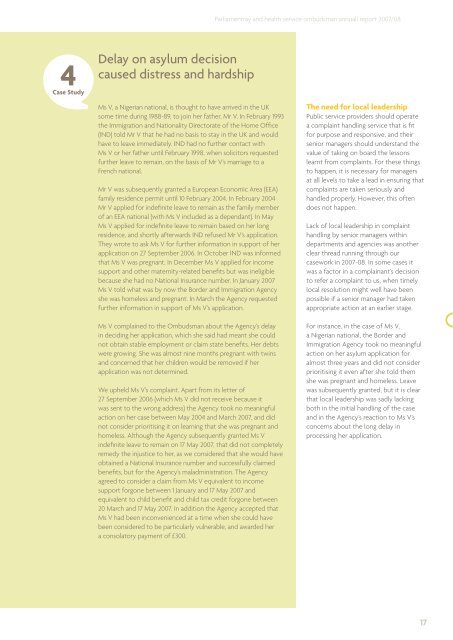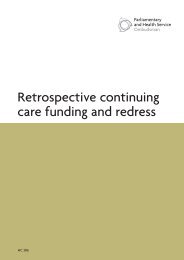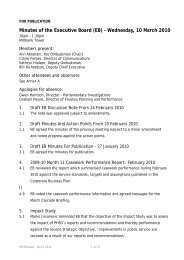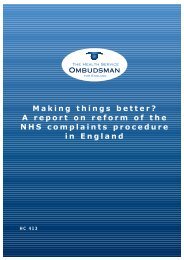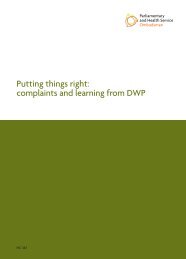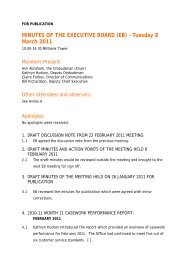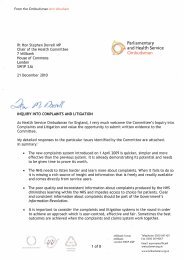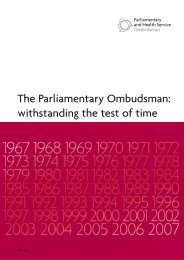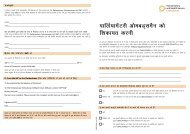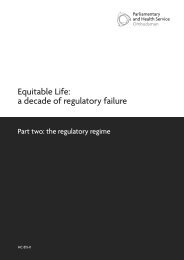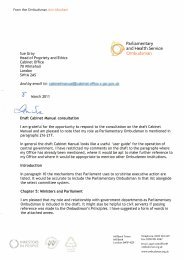Annual Report 2007-08 - the Parliamentary and Health Service ...
Annual Report 2007-08 - the Parliamentary and Health Service ...
Annual Report 2007-08 - the Parliamentary and Health Service ...
- No tags were found...
Create successful ePaper yourself
Turn your PDF publications into a flip-book with our unique Google optimized e-Paper software.
Parliamentray <strong>and</strong> health service ombudsman annuall report <strong>2007</strong>/<strong>08</strong>4Case StudyDelay on asylum decisioncaused distress <strong>and</strong> hardshipMs V, a Nigerian national, is thought to have arrived in <strong>the</strong> UKsome time during 1988-89, to join her fa<strong>the</strong>r, Mr V. In February 1993<strong>the</strong> Immigration <strong>and</strong> Nationality Directorate of <strong>the</strong> Home Office(IND) told Mr V that he had no basis to stay in <strong>the</strong> UK <strong>and</strong> wouldhave to leave immediately. IND had no fur<strong>the</strong>r contact withMs V or her fa<strong>the</strong>r until February 1998, when solicitors requestedfur<strong>the</strong>r leave to remain, on <strong>the</strong> basis of Mr V’s marriage to aFrench national.Mr V was subsequently granted a European Economic Area (EEA)family residence permit until 10 February 2004. In February 2004Mr V applied for indefinite leave to remain as <strong>the</strong> family memberof an EEA national (with Ms V included as a dependant). In MayMs V applied for indefinite leave to remain based on her longresidence, <strong>and</strong> shortly afterwards IND refused Mr V’s application.They wrote to ask Ms V for fur<strong>the</strong>r information in support of herapplication on 27 September 2006. In October IND was informedthat Ms V was pregnant. In December Ms V applied for incomesupport <strong>and</strong> o<strong>the</strong>r maternity-related benefits but was ineligiblebecause she had no National Insurance number. In January <strong>2007</strong>Ms V told what was by now <strong>the</strong> Border <strong>and</strong> Immigration Agencyshe was homeless <strong>and</strong> pregnant. In March <strong>the</strong> Agency requestedfur<strong>the</strong>r information in support of Ms V’s application.Ms V complained to <strong>the</strong> Ombudsman about <strong>the</strong> Agency’s delayin deciding her application, which she said had meant she couldnot obtain stable employment or claim state benefits. Her debtswere growing. She was almost nine months pregnant with twins<strong>and</strong> concerned that her children would be removed if herapplication was not determined.We upheld Ms V’s complaint. Apart from its letter of27 September 2006 (which Ms V did not receive because itwas sent to <strong>the</strong> wrong address) <strong>the</strong> Agency took no meaningfulaction on her case between May 2004 <strong>and</strong> March <strong>2007</strong>, <strong>and</strong> didnot consider prioritising it on learning that she was pregnant <strong>and</strong>homeless. Although <strong>the</strong> Agency subsequently granted Ms Vindefinite leave to remain on 17 May <strong>2007</strong>, that did not completelyremedy <strong>the</strong> injustice to her, as we considered that she would haveobtained a National Insurance number <strong>and</strong> successfully claimedbenefits, but for <strong>the</strong> Agency’s maladministration. The Agencyagreed to consider a claim from Ms V equivalent to incomesupport forgone between 1 January <strong>and</strong> 17 May <strong>2007</strong> <strong>and</strong>equivalent to child benefit <strong>and</strong> child tax credit forgone between20 March <strong>and</strong> 17 May <strong>2007</strong>. In addition <strong>the</strong> Agency accepted thatMs V had been inconvenienced at a time when she could havebeen considered to be particularly vulnerable, <strong>and</strong> awarded hera consolatory payment of £300.The need for local leadershipPublic service providers should operatea complaint h<strong>and</strong>ling service that is fitfor purpose <strong>and</strong> responsive, <strong>and</strong> <strong>the</strong>irsenior managers should underst<strong>and</strong> <strong>the</strong>value of taking on board <strong>the</strong> lessonslearnt from complaints. For <strong>the</strong>se thingsto happen, it is necessary for managersat all levels to take a lead in ensuring thatcomplaints are taken seriously <strong>and</strong>h<strong>and</strong>led properly. However, this oftendoes not happen.Lack of local leadership in complainth<strong>and</strong>ling by senior managers withindepartments <strong>and</strong> agencies was ano<strong>the</strong>rclear thread running through ourcasework in <strong>2007</strong>-<strong>08</strong>. In some cases itwas a factor in a complainant’s decisionto refer a complaint to us, when timelylocal resolution might well have beenpossible if a senior manager had takenappropriate action at an earlier stage.For instance, in <strong>the</strong> case of Ms V,a Nigerian national, <strong>the</strong> Border <strong>and</strong>Immigration Agency took no meaningfulaction on her asylum application foralmost three years <strong>and</strong> did not considerprioritising it even after she told <strong>the</strong>mshe was pregnant <strong>and</strong> homeless. Leavewas subsequently granted, but it is clearthat local leadership was sadly lackingboth in <strong>the</strong> initial h<strong>and</strong>ling of <strong>the</strong> case<strong>and</strong> in <strong>the</strong> Agency’s reaction to Ms V’sconcerns about <strong>the</strong> long delay inprocessing her application.17


